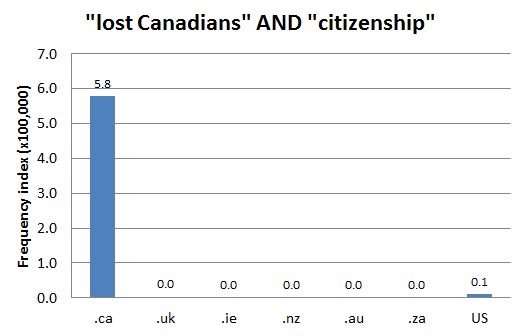DCHP-2
lost Canadian "lost" Canadian, Lost Canadian DCHP-2 (October 2016)
n. — Administration
a person with convincing grounds for Canadian citizenship, such as marriage to a Canadian, or a Canadian parent, excluded from citizenship because of changes to the citizenship laws.
Type: 1. Origin — Lost Canadian is Canadian in origin and most prevalent in Canada (see Chart 1). The term has also been used to refer to Canadians who have emigrated abroad. By the early 2000s, lost Canadian had come to refer to those who had reason to believe themselves to be citizens, often for many decades, only to discover that they were not according to the Citizenship Acts of 1947 and/or 1977.
The Canadian government classifies four types of lost Canadians:
1. war brides
2. people born abroad to a Canadian parent before the 1977 Citizenship Act came into effect in February 1977
3. people who lost their citizenship between January 1947 and February 1977 because they or their parent acquired the nationality or citizenship of another country
4. second and subsequent generations of Canadians who were born abroad after 1977 (see Parliament of Canada reference, "Reclaiming Citizenship for Canadians").
Several highly publicized cases of lost Canadians brought the issue to the attention of the Canadian public in the early 2000s. The technicalities and laws that had stripped people of citizenship or prevented them from being entitled to it are often seen as archaic. Bill C-37 was implemented in 2009 to redress the issues and it granted or restored citizenship for the the majority of lost Canadians (see Parliament of Canada reference, "Gov't of Canada Response to Standing Committee’s 11th Report"). Some cases, however, remain unresolved to the present day (see, e.g., the 2010 quotation).See also: citizenship court
- Canadian citizenship law has produced lost Canadians on a number of occasions. These cases, generally but not exclusively, affect children born abroad with one parent who is a Canadian.
References:
- Parliament of Canada "Gov't of Canada Response to Standing Committee’s 11th Report" Accessed 19 Nov. 2013
- Parliament of Canada "Reclaiming Citizenship for Canadians" Accessed 19 Nov. 2013
Images:
Chart 1: Internet Domain Search, 25 Sep. 2013
